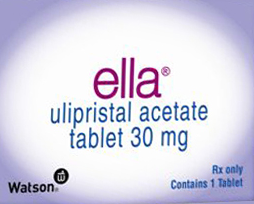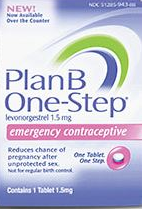Emergency Contraception
|
What is Emergency Contraception?
Emergency contraception is birth control that prevents pregnancy after sex, which is why it is sometimes called "the morning after pill," "the day after pill," or "morning after contraception." You can use emergency contraception right away - or up to five days after sex - if you think your birth control failed, you didn't use contraception, or you were made to have sex against your will. Emergency contraception makes it much less likely you will get pregnant. But emergency contraceptives are not as effective as birth control that's used before or during sex, like the pill or condoms. So if you are sexually active or planning to be, don't use emergency contraception as your only protection against pregnancy. Also, emergency contraception does not protect against sexually transmitted infections, like HIV (only condoms do). For help choosing the best regular method for you, try these free online tools: Method Match (from ARHP) or My Contraception Tool (from a UK-based educational website). Your options for emergency contraception include:
Emergency Contraceptive Pills In the United States there are several options for the “morning after pill”. These include:
Where Can I get the morning after pill? In the United States, regulations on the sale of EC have changed frequently, so it can be quite confusing. Below is some information about how the different brands of EC are sold. If you want to use ella, call the pharmacy first to be sure that it is in stock.
How are progestin- only emergency contraception pills taken? Progestin-only emergency contraception pills are available as a single pill or two pills that are taken 12–24 hours apart. The pills should be started as soon as possible after having unprotected sex. Progestin-only pills can be used more than once, even within the same menstrual cycle. How effective are progestin-only emergency contraception pills? Progestin-only pills are thought to prevent pregnancy mainly by preventing ovulation. They will not work if you are already pregnant and will not affect a pregnancy that has started. They are about 75% effective in preventing pregnancy. Their effectiveness decreases with time. They are most effective when taken within 72 hours (3 days) of unprotected sex. They are moderately effective when taken within 120 hours (5 days). What are combination pills? Birth control pills that contain estrogen and progestin are called combination pills. How are combination pills used for emergency contraception? Taken in higher-than-usual amounts, combination birth control pills can be used for emergency contraception. They are taken in two doses. The number of pills needed for emergency contraception is different for each brand of pill. Combination emergency contraceptive pills need to be taken as soon as possible up to 120 hours, or 5 days, after unprotected intercourse. They are thought to work by preventing ovulation. How effective are combination emergency contraceptive pills? Combination emergency contraceptive pills are not as effective in preventing pregnancy as progestin-only pills. For this reason and because of the higher risk of nausea and vomiting, progestin-only methods are preferred over combination emergency contraceptive pills. Where can I find out how many combination pills to take for emergency contraception? A health care provider or pharmacist can tell you how many pills you should take for the type of birth control pills that you have. This information also is available at the web site http://www.not-2-late.com. How is ulipristal (ella) taken? Ulipristal can be taken up to 120 hours (5 days) after unprotected intercourse with no decrease in effectiveness. Ulipristal is available by prescription only. Research suggests that it may prevent more pregnancies than progestin-only pills when taken as directed. How often can ulipristal (ella) be taken? Because the effects of repeated use of ulipristal are not yet known, it should be taken only once during a menstrual cycle. It also may decrease the effectiveness of hormonal birth control methods. For this reason, a nonhormonal method, such as a condom, should be used after taking ulipristal until your next menstrual period starts. How can I get emergency contraception pills? Ulipristal and combination birth control pills are available only by prescription. Plan B One-Step is a progestin-only pill that can be bought at a pharmacy without a prescription. Next Choice One Dose is a progestin-only pill that can be bought at a pharmacy without a prescription if you are 17 years or older and show proof of age and by prescription only if you are younger than 17 years. You can go to http://eclocator.not-2-late.com or call the Emergency Contraception Hotline (888-NOT- 2-LATE) to find a health care provider who can provide a prescription. Also, many health care providers will give an advance prescription for emergency contraception. Please ask about a prescription at your next visit. What are the side effects of emergency contraception pills? Nausea and vomiting may occur after taking the progestin-only and combination pills. Your next menstrual period may not occur at the expected time. You may have bleeding or spotting in the week or month after the treatment. Other possible side effects include the following: • Abdominal pain and cramps • Breast tenderness • Headache • Dizziness • Fatigue These side effects usually go away within a few days. Possible ulipristal (ella) side effects include headache, nausea, and abdominal pain. Your menstrual period may occur earlier or later than expected. Spotting may occur. How safe are emergency contraception pills? The progestin-only pills and the combination birth control pills are safe even for women who normally are cautioned against using hormonal birth control methods. Emergency contraception is used for a much shorter period of time than regular use of a hormonal birth control method. However, these pills should not be used as long-term birth control because frequent use of emergency contraception results in more side effects. Do I need to see a health care provider after using emergency contraception pills? No other tests or procedures are needed after taking emergency contraception. However, you should see your health care provider for a pregnancy test if you have not had a period within a week of when you expect it. Progestin-only pills and combination pills do not harm a pregnancy or the health of the baby if you are already pregnant. Currently, there is little information about whether ulipristal can harm a pregnancy if you are already pregnant. Can I get pregnant later in my menstrual cycle after I have used emergency contraception pills? It is possible to become pregnant later in the same menstrual cycle if you have used emergency contraception pills. To prevent pregnancy, you should use a barrier contraception method, such as a condom, until your next menstrual period occurs. You also can start birth control pills, the patch, or the vaginal ring immediately after taking emergency contraception, but you also need to use a barrier method until your next menstrual period starts. How is the copper intrauterine device (IUD) used as emergency contraception? The copper IUD must be inserted within 5 days of having unprotected sex. It is about 99% effective in preventing pregnancy. A benefit is that the IUD then can be used for long-term birth control. A drawback is that it does not protect against STDs. If you are at risk of STDs, a male or female condom should be used in addition to the IUD for STD protection. Also, some women with certain medical conditions cannot use an IUD. Please call our office with any questions (714) 912-2211 |


